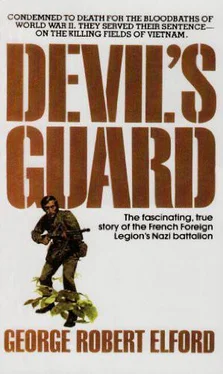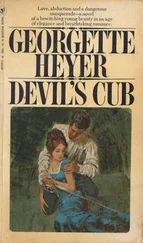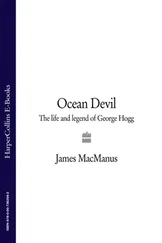“I’ve already said that we don’t need rich people.”
“At least you admit that Communism thrives on murder!” Schulze snapped. “But even primitive people know that nothing can be achieved by murder and robbery— what the Viet Minh is doing.”
“The Viet Minh is not the Communist party,” Kwang remarked with a smile. “The Viet Minh is the striking fist of all the patriots who want freedom and independence.”
“Who are the leaders of the Viet Minh?” Erich asked sharply. “Who are the commanders, the commissars, the propagandists? Are you not a Communist, Kwang?”
“It is only natural that the most experienced revolutionaries should lead a national liberation movement.”
“Call it by its name, Tovarich Kwang. Don’t say revolutionary when you want to say Communist. We know that you are trying hard to hoodwink the world by calling your Communist Party the People’s Party, Revolutionary Party, Workers Party, and the devil knows what else. Why do you need a disguise? Honest people don’t need to hide.”
“One day the colonialists will be expelled. Then the people may choose freely what society they wish to build for themselves.”
“Merde!” Schulze exclaimed. “Can you name one liberated country where the Communists have not seized all power over life and death and have not exterminated all the opposition?”
“Drop the high-flown polemics, Erich!” Eisner warned. “You aren’t talking to a panel of professors.”
He rose and spoke to the villagers. “Commissar Kwang, who is from China, is talking to you about the Soviet Union, trying to explain to the people here what is good for them. The colonialist officer here,” he pointed at Schulze, “is trying to tell you that whatever Kwang may say, when the Communist party wins power, the Communists kill everybody who disobeys their orders or desires something else. As you can see, neither Kwang nor Kly has anything to say against it, so it must be true.”
“That is what you say and what your newspapers write,” Kwang said sarcastically. “But we are your prisoners and in no position to argue with you.”
“Is anyone holding a knife at your throat, Commissar Kwang?” Karl cut in. “Are you being beaten or tortured? If not, then speak up, tovarich first class. Convince us that your cause is a just cause. We might discard our weapons right here and join the Lao Dong.”
“This is Erich’s party, Karl. Let him enjoy it,” Riedl remarked.
“Tell us just one thing your great revolution has so far achieved, apart from drowning the people in their own blood,” Schulze continued. “Has your Ho Chi Minh improved the lives of the proletariat in this country? Have these people in this village, Kwang, received anything from your movement? Have you dug a well? An irrigation canal? Have you built as much as a public school? No, Tovarich Commissar. You have only destroyed those which were here before.”
“We have no time to bring about social changes or to build anything. We are obliged to fight. When peace comes, we will start building. But if you want to see what Communism can build, you should go to the Soviet Union and see it there.”
Schulze waved an arm to the crowd. “These people here have no money to visit the Soviet Union and enjoy the benefits of Communism there. They want to enjoy life here!” And as Xuey translated his words, soft laughter echoed from the crowd for the first time; only quiet laughter but it was laughter and I knew that Erich had scored a small point.
“The people here will enjoy life after the liberation,” Kwang blurted, now somewhat agitated.
“Liberation,” Schulze sneered. “How many countries has Stalin liberated lately? The British colonialists have just liberated India, as you probably know, you zealous deliverers of slaves. Why don’t you go and ask the American workers if they would like to be liberated by Stalin? Afterwards you may also ask the Russian workers if they would want to be slaves in America? I fancy the outcome of your inquiry.”
“The Russian workers would spit in your face if you insulted them by asking such a filthy imperialist provocation,” Kly hissed before Kwang could answer.
“Sure!” Schulze chuckled. “That is exactly what they would do if you ask them on the Red Square, facing the Kremlin. You should take them to West Berlin and ask them there.”
My troops were roaring with laughter that now engulfed most of the spectators, including ourselves. The “dialogue” was gradually turning into a “hand-to-hand” combat between Erich and the agitators, but Schulze was holding his own quite actively. “I was in Russia, too, Commissar Kwang,” Erich said quietly. “I went there as an enemy, but the people greeted me as these people here would greet Iord Buddha if he came walking down the road.”
He rose abruptly and faced the villagers with his eyes ablaze. “The agitators are telling you many beautiful lies about the Soviet Union, about China and about Communism. Now let me tell you what the Communists are truly doing in Russia. First they killed all the rich people and seized their property. When there were no more rich people to be robbed and murdered, or to be put into slave camps, Stalin began to exterminate the class enemies; they were not rich people but writers, doctors, engineers, schoolteachers—learned people. If they had property and money, they had worked for it for many years. But everyone who dared to disagree with Stalin was killed or put into prisons. When there were no more class enemies either, Stalin turned upon his own comrades, all old Communists. He killed his own army officers by the thousands. They condemn capitalism but the capitalists have never massacred anyone. Now they say that the capitalist owner of a shoe factory, for instance—let us call him, Ivan Ivanovich—produced only five hundred pairs of shoes every week; the Communist factory makes five thousand. But the shoes which Ivan Ivanovich made were good, shoes and the worker could wear them for two years. Ivan Ivanovich had to make good shoes, otherwise the people wouldn’t buy them and he would go bankrupt. The state-owned factory has no such problems. If your Communist shoes crack open in four weeks, you should not even complain, for if you do, you accuse the State, the Communist Party, and so you are not a loyal citizen but an enemy agent. The Communists won’t give you another pair of shoes but a pair of bullets in your head.
“Now the Communists are promising you everything just to help them win the war. When the war is over, says the commissar, they will start building for you. Building maybe, but not schools and hospitals; they will build army barracks and jails. They might build factories too, but to make tanks not tractors. The hoe or the shovel they give you will break in a week. Only the weapons of the Red army will last. The Communists have always been good weapon makers, for the bayonet is the only foundation the Party can stand on. Without bayonets and machine guns neither Stalin nor Mao Tse-tung would survive for a year. If you think that you are being oppressed by the French colonialists, Just wait until Ho Chi Minh becomes your master. You will find a policeman behind every hut in your village; brother will betray brother and the son will sell his father.”
Kwang was no longer smiling. He sat on the bench, chewing his underlip nervously. The villagers listened in utter silence; their faces betrayed no emotion—only alertness. Some of the elder men were listening so intently that their mouths hung open and their eyes appeared transfixed on Schulze. I was not sure if all that Erich said had reached the people, and if so, how deeply his words had penetrated into their simple minds. I was sure of only one thing, that never before had they witnessed someone challenging the Viet Minh platform openly, in front of people. They had never heard someone denouncing the holiest of the Communist prophets and everything they stood for. No one could ever call a Viet Minh leader a liar and live to tell his story. Besides, no French officer in Indochina had ever bothered to talk to les sauvages on equal terms, and certainly not about political or economic issues. The Communists were always permitted to rake in the benefits of their uncontested propaganda.
Читать дальше












